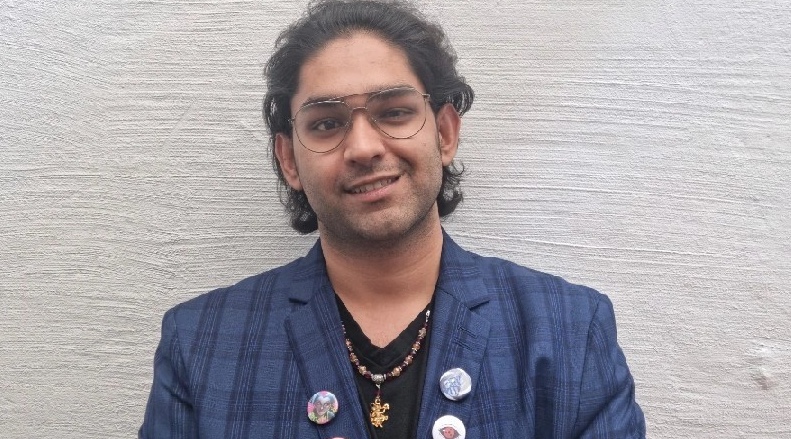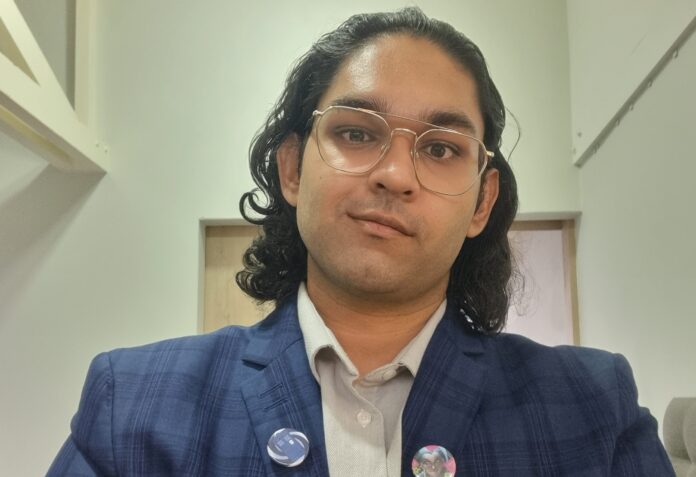They say when the student is ready, the teacher will appear. This couldn’t be truer for Kushal Sithlu, CEO of the South African studio Pineapple on Pizza. A few months into his Computer Science degree in 2018, he felt something was amiss. “I love programming, but it’s not giving me the creativity I crave,” Sithlu would admit.
His turning point came in 2019 at Comic Con Africa, where he discovered a Game Design degree at Wits University’s stand. “I don’t know where I’d be if I hadn’t attended that Comic Con,” he reflects. However, it still took a nudge from a dreadful experience in an Applied Mathematics class to propel him to switch from Computer Science to Game Design.
In 2022, a life-threatening incident could have derailed his dreams, but his passion for expressing his creativity through game development fueled his recovery, leaving his physicians in awe. Today, his award-winning studio, just a year old, has been a part of the prestigious Google Indie Games Accelerator and the Creation Africa Program.
“Growing up, I was a really mischievous kid,” Sithlu recalls. “If you ask my parents, they would say I was a rascal. I was really naughty and I loved games. We lived in a complex in Durban, and I was lucky enough to have my big cousins as neighbors with games and consoles. We’d play different games on each other’s PlayStations or Xboxes. I remember playing Dragon Ball Z: Budokai Tenkai Chi 2 and watching Yu-Gi-Oh with friends. My mother actually introduced me to games; we played Jazz Jackrabbit, Spider-Man 2, and old Tomb Raider games together. My parents wouldn’t let me play anything excessively violent, but I would sneak around to get glimpses of the games I wasn’t allowed to play.”
Geeky technical stuff
Sithlu’s cousins, like big brothers, heavily influenced him. “They were always into geeky and technical stuff, which drove me to pursue a computer field. Once I started programming, the logic just clicked. It was like a rhythm I loved. I even moved schools so I could take IT classes,” he shares.
On his artistic side, Sithlu recalls writing little stories and poems in the back of his notepads but didn’t show them to people until one day in grade 10. “A friend asked me for adjectives, and I told her to give me a scenario. I quickly wrote a story, and she loved it. That’s when I started writing more, getting into poetry. I have around 160 poems now. Mrs. Van Reenen, my high school English teacher, loved my poetry, and I enjoyed her classes. Dissecting poems came naturally to me.” He also entered poetry contests.

Sithlu and his family moved to Durban from East London when he was in grade 10. In his new school, he says his IT teacher was amazing. “He would make Star Wars jokes and start Lord of the Rings discussions, occasionally letting us play games once we finished our work.” In Grade 11, Sithlu created a mathematical game that his cousins loved. “I think I would have ended up in educational games at the very least.”
Pivotal moment
Sithlu pursued a Computer Science Degree at Wits University but decided to switch after a pivotal moment. “I remember the specific moment when I made the decision because I was sitting in an Applied Mathematics class, and on the screen was a picture of a luscious green plant with a droplet of water falling off of it. The lecturer suggested that all of it, including the droplet, could be explained by math. And it was at this point that I was like, NO! I stood up and walked across campus, all the way to the Arts faculty, and sat down with the most amazing woman there, Hamisha. She helped me apply, and from there I pursued game design.”

After completing studies at Wits University, Sithlu was incubated at the Tshimologong Precinct. “It was great! It gave us room to express ourselves with more security, and we had a lot of mentorship and networking opportunities,” he says. This experience helped him see himself more as an entrepreneur. However, Sithlu realized his entrepreneurial journey began earlier, during his teenage years. “At East London, we had sales weeks every once in a while. I’d buy chocolates and sweets from wholesale stores and sell them around school,” he recalls.
Promoting games
He also learned business skills. “My business teacher insisted on practical skills like bookkeeping and recycling. I made pillows from curtain fabrics for children,” he explains. He humorously recalls a market day incident: “We made spicy chicken salad for the eco market, but ants got into our cooler bag. We opened it and were like, oh no!” Despite that incident, Sithlu enjoys sales and marketing. “At Comic Con, I loved promoting our games. For Braai Guy, I’d ask, ‘Would you like to smack someone with a Koeksister or chuck a Boerewors at somebody?’ I had so much fun with it. That salesmanship stuck with me,” he adds.
A month ago, Sithlu was juggling a Master’s in Game Design while running a company and participating in two business accelerators. “It’s difficult, I’m not gonna lie. It’s been a struggle balancing my master’s with all the business stuff, especially now that we were in these accelerators,” he says. “Sometimes, they had even more classes than the ones I have in my master’s. The Master’s requires a lot of hard work and soul searching. I’m doing my master’s on games and education because I think games can have a huge impact on education and make learning more fun and accessible.”
Make a real difference
Working on this topic is personal for Sithlu. “I have a brother with various learning disabilities. He loves games, and I saw how the education system failed him. He’s one of the brightest kids I know, but the school system just tosses him out because it doesn’t know how to reach kids like him. I want to make a real difference,” he explains. “People think games are just for entertainment, but there’s so much potential. It’s all about objective-driven interaction, so all you have to do is make the objective learning.”

The loss of control due to health reasons hits close to home for Sithlu. In 2022, he contracted Covid, experiencing life-threatening effects. “I had two seizures and dislocated both my shoulders, needing two pins in my left arm and one in the right. I was hospitalized for nearly a week and had my arms strapped up for about four months,” he recounts. “I couldn’t feed myself or care for myself fully for about three months and dealt with painkillers and memory loss, which I still struggle with.
Borderline miraculous
I remember my physiotherapist told me I was crazy because I would do extra exercises on top of what she gave me. After all, I had to get back to making and playing games. She told me it was borderline miraculous that I healed as fast as I did.” His school deadlines were extended, affecting his final year project, Null Factor, but even on its smaller scale, it won an award at the Fak’ugesi Festival in 2023. “This was a dream come true,” Sithlu reflects, “and a validation that I was on the right path.”
The Pineapple on Pizza team developed a sequel to their game Braai Guy at the Google Indie Games Accelerator. “It’s taken on a whole new style of gameplay, and I’m excited for everything,” Sithlu shares. Reflecting on the first game’s impact, he adds, “Being at Comic-Con and seeing how local South Africans connected with it was exciting. We received 120 suggestions for local foods to add to the game.”
Creation Africa Program
Regarding their accelerator experience, Sithlu described it as follows. “It was like stepping into a whole new world of games. We learned about different business strategies and technologies we didn’t know existed,” he says. “We’re even going to India for the program’s graduation, where we’ll meet other studios. I’m really looking forward to that.”
At the Creation Africa Program, they underwent intensive mentoring for a month. “We covered legal, IP, and finance, and connected with developers and studios overseas,” Sithlu explains. Despite not studying business at university, he views the program as a hands-on business course aimed at helping them establish and scale their business and prepare them to be venture capitalist-ready. “It’s not just about the funding; it’s about joining the Euro Equity Network, a platform that connects investors with businesses and entrepreneurs,” he adds, highlighting Pineapple on Pizza’s aim for international reach.
Representing my studio
Returning to Africa Games Week and Playtopia Festival in 2023 was a milestone for Sithlu. “Attending these events as a founder was different from my first time as an undergraduate. The perspective shift was significant; I was no longer just learning but also sharing my journey and insights,” he reflects. “The first time at Playtopia was an adventure, especially with the train jam on the 2nd AMAZE. Last year, it felt more grounded yet exhilarating as I represented my studio. We had Swing on display there, and I was so excited when we received the approval email. At Africa Games Week, I was on the business platform and booked around 12 meetings. These experiences have been vital in our growth and networking.”

Sithlu credits his family and team as his biggest support, with his brother being a key playtester. His team at Pineapple on Pizza consists mostly of friends and Wits University peers. Reflecting on his journey, he would tell his younger self, “It’s tougher than you think, and it requires a lot of work, but it will all be worth it in the end.”

